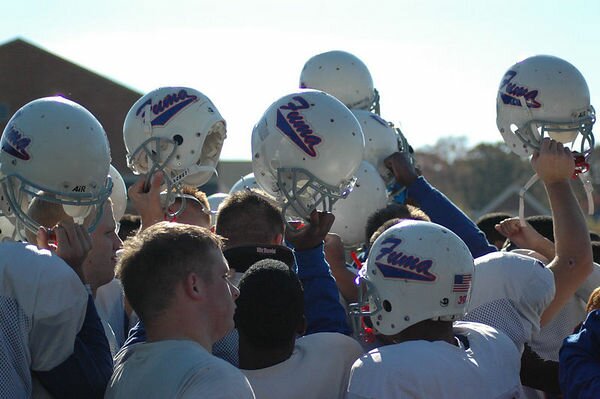NEWS- Sore subject: Infamous NCAA list inclusion shocks FUMA
For decades, Fork Union Military Academy has been known chiefly for two things: the prowess of its student athletes (including 15 NFL and six NBA players) and the uniqueness of its curriculum. Now the National Collegiate Athletic Association has raised questions that jeopardize the athletic program, possibly because of a misunderstanding about the school's academics.
Since 1951, FUMA has operated under the "one subject plan." Instead of taking six or seven classes concurrently over the course of a year, cadets take one core subject at a time, five hours a day for seven weeks. Although the format is unorthodox, it's well advertised.
Decades of readers of Boy's Life magazine have seen the little advertisements: "Our one subject plan increases honor roll." And FUMA says the number of hours spent in class on each subject roughly equals– or exceeds– the time students spend per subject at other high schools.
That's why, on July 5, FUMA officials were surprised and outraged to find the school on a widely publicized list of 22 schools nationwide whose academic programs are subject to a review from the NCAA. If Fork Union fails the review, the NCAA will no longer accept transcripts from the school, and graduating athletes will not be allowed to play at the varsity collegiate level. The future of the athletic program hangs in jeopardy.
"It is an unconscionable act to paint the Academy with the same brush as those who are mocking the system," FUMA president Lt. General John Jackson said in a statement.
The list is part of the NCAA's recent effort to crack down on so-called "diploma mills" such as Philadelphia's Lutheran Christian Academy– a basketball powerhouse that came under scrutiny when the Washington Post reported in February that it had only one employee (the basketball coach), no classrooms, and no academic instruction.
By contrast, Jackson says of FUMA: "Our record of academic achievement stands on its own, and to question the rigor, without even visiting the campus, or, at the very least, telling the Academy what concern it may have, underscores the lack of sensitivity and professionalism one normally comes to expect from the NCAA."
Given that Fork Union's course of study does extend beyond the playing field, how did the Academy end up on this list?
While refusing to discuss FUMA's specific case, NCAA's Kevin Lennon– as vice president for membership services, the man in charge of the investigation– says, "The reason that anyone was placed on the list is that there were irregularities in the transcripts of the students attending these schools." In an interview with the Hook, he listed among the irregularities "students taking in one year sequential courses like Algebra I and Algebra II that are meant to be taken over a series of years."
FUMA athletic director and head prep football coach Micky Sullivan explains that just such an "irregularity" happens at his school all the time, but not in a way that should raise suspicion. It's all part of the one-subject plan.
"You can take Algebra I one semester and then take Algebra II the next, or English 11 one semester and English 12 the next," Sullivan says. "But they get enough hours just like a regular course. That's why we can do what we do."
In fact, many alumni have credited the one-subject plan as the reason for their academic success.
"With the one-subject plan, you have more of a relationship with your teacher and more one-on-one help," says Jeff Schrad, a 2002 FUMA graduate who is now a guard on the Univerisity of Virginia football team. "It's just a matter of numbers. They have a better opportunity to invest personal time with their students."
In some cases, that added attention may lead to another of the irregularities the NCAA flagged. "They have to examine their own history and see if they have any student athletes who have large jumps in GPA," Lennon says, citing "1.8 to a 4.0 in a single year" as an example.
While a leap of such magnitude isn't the norm at Fork Union, Sullivan says that large jumps in GPA are, in fact, the goal at this military boarding school.
"We have a lot of kids who haven't done exceptionally well before they come here. That's why they're here," Sullivan says.
"Take the girls, the malls, the DVDs, the cell phones, all the distractions out of the equation," Sullivan continues. "They can't cut class. They go to class six hours every day, they sit down every night and study for two hours, and they have teachers and coaches checking up on them all the time. What do you think is going to happen to their grades?"
Lennon would not say when the inquiry into Fork Union would begin or what it would entail, but he did note that it would only happen once the NCAA had examined the transcripts of all the student athletes matriculating this fall.
When that inquiry gets under way, Sullivan is confident FUMA will be exonerated. "You just show them what we do. I don't think there's a question," he says. "They're going to realize very quickly that we're not a diploma mill."

Fork Union's "one-subject plan" might be the reason behind the military school's inclusion in the NCAA probe.
COURTESY OF FORK UNION MILITARY ACADEMY
#